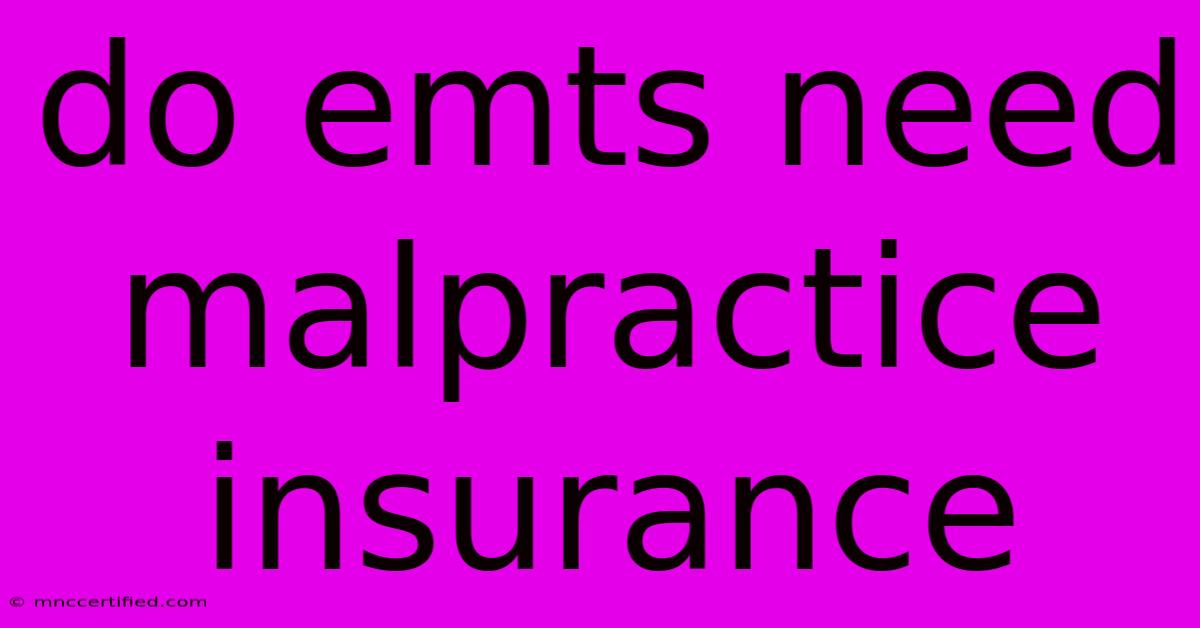Do Emts Need Malpractice Insurance

Table of Contents
Do EMTs Need Malpractice Insurance? A Comprehensive Guide
Emergency Medical Technicians (EMTs) play a crucial role in our healthcare system, providing immediate medical care in high-pressure situations. Given the inherent risks involved, a critical question arises: Do EMTs need malpractice insurance? The short answer is: it's highly recommended, and often a requirement. This article delves into the complexities of EMT malpractice insurance, exploring the necessity, types of coverage, and factors to consider when making this important decision.
The Risks EMTs Face
EMTs face numerous potential risks in their daily work, making malpractice insurance a vital consideration. These risks include:
- Medical Errors: Misdiagnosis, incorrect treatment, medication errors, or failure to provide adequate care can lead to serious patient harm and potential lawsuits.
- Patient Injuries: Injuries sustained during patient transport or handling, even unintentionally, can result in legal action.
- Equipment Malfunction: Failure of medical equipment can compromise patient care and lead to liability.
- Emergency Situations: The chaotic nature of emergency situations can increase the chance of errors or omissions.
- Documentation Errors: Inaccurate or incomplete documentation can weaken a defense against malpractice claims.
These scenarios highlight the potential for significant financial and legal repercussions for EMTs without adequate protection.
Why Malpractice Insurance is Crucial for EMTs
While many employers provide some level of coverage, relying solely on employer insurance is risky. Here's why EMTs should consider obtaining their own malpractice insurance:
- Gaps in Employer Coverage: Employer policies may have limitations, exclusions, or may not cover incidents occurring outside of work hours or during volunteer activities.
- Personal Liability Protection: Even with employer coverage, personal assets could be at risk if a lawsuit exceeds the policy limits. Personal malpractice insurance offers an additional layer of protection.
- Volunteer Work: Many EMTs volunteer their services, and employer insurance typically doesn't extend to volunteer activities. Personal insurance provides crucial coverage in these instances.
- Future Career Advancement: Having personal malpractice insurance demonstrates professionalism and commitment, potentially increasing career opportunities.
- Peace of Mind: Knowing you're adequately protected allows you to focus on providing the best possible patient care without the constant worry of potential legal battles.
Types of Malpractice Insurance for EMTs
Several types of malpractice insurance cater to the specific needs of EMTs:
- Claims-Made Policy: This covers incidents that occur and are reported during the policy period. Tail coverage is often necessary to extend protection beyond the policy's expiration.
- Occurrence Policy: This covers incidents that occur during the policy period, regardless of when the claim is filed. This offers broader long-term protection.
Choosing the Right Malpractice Insurance
Selecting the right policy requires careful consideration of several factors:
- Coverage Limits: Determine the appropriate level of coverage to protect your assets adequately.
- Policy Exclusions: Understand what situations are not covered by the policy.
- Premium Costs: Compare premiums from different insurers to find the best value for your needs.
- Reputation of the Insurer: Choose a reputable and financially stable insurer to ensure claim payouts.
Beyond Insurance: Risk Management Strategies
While malpractice insurance is essential, proactive risk management is equally important. This includes:
- Thorough Documentation: Maintaining accurate and complete patient records is crucial.
- Continuing Education: Staying updated on the latest medical protocols minimizes the risk of errors.
- Following Protocols: Adhering to established protocols and procedures reduces liability.
- Maintaining Equipment: Regularly checking equipment functionality ensures patient safety.
In Conclusion:
While employer-provided coverage may offer some protection, obtaining personal malpractice insurance is strongly advised for EMTs. The inherent risks of the profession, coupled with the potential for significant financial and legal consequences, make it a crucial investment in your professional career and personal well-being. By understanding the different types of policies available and implementing effective risk management strategies, EMTs can safeguard themselves and continue to provide vital emergency medical services with confidence. Remember to consult with an insurance professional to determine the best coverage for your individual circumstances.

Thank you for visiting our website wich cover about Do Emts Need Malpractice Insurance. We hope the information provided has been useful to you. Feel free to contact us if you have any questions or need further assistance. See you next time and dont miss to bookmark.
Featured Posts
-
Celebrating Jon Kennys Father Ted Legacy
Nov 17, 2024
-
Jon Kenny Actor Comedian Dies At 66
Nov 17, 2024
-
Live Score West Indies Vs England T20
Nov 17, 2024
-
How Much Is E And O Insurance For Film
Nov 17, 2024
-
English Springer Spaniel Insurance
Nov 17, 2024